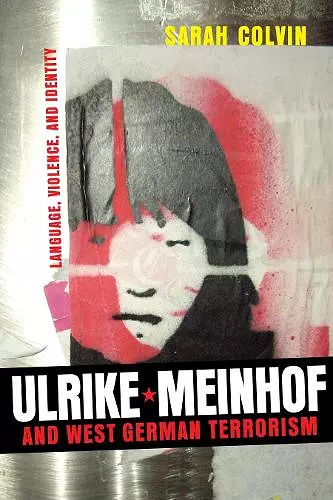Ulrike Meinhof and West German Terrorism
Language, Violence, and Identity
Format:Hardback
Publisher:Boydell & Brewer Ltd
Published:1st Nov '09
Currently unavailable, and unfortunately no date known when it will be back

First specialized study of Meinhof and the RAF in English, focusing on their use of language to justify extreme violence. In 1970 Ulrike Meinhof abandoned a career as a political journalist to join the Red Army Faction; captured as a terrorist along with other members of the group in 1972, she died an unexplained death in a high-security prison in 1976. A charismatic spokesperson for the RAF, she has often come near to being idealized as a freedom fighter, despite her use of extreme violence. In an effort to understand how terrorism takes root, Sarah Colvin seeks a dispassionate view of Meinhof and a period when West Germany was declaring its own "war on terror." Ulrike Meinhof always remained a writer, and this book focuses on the role of language in her development and that of the RAF: how Meinhof came to justify violence to the point of murder, creating an identity for the RAF as resistance fighters in an imagined state of war that was reinforced by the state's adoption of what Andreas Musolff has called "war terminology."But its all-powerful identity as a fighting group eroded the RAF's empathy with other human beings -- even those it once claimed to be "fighting for." It became a closed unit, self-justifying and immobilized by its own convictionthat everything it did must be right. This is the first specialized study of Meinhof and the RAF in English -- which is remarkable given the current interest in the topic in both Europe and the U.S. Sarah Colvin is Professor and Eudo C. Mason Chair of the German Department at the University of Edinburgh, UK.
[S]hould ignite more interest [in Meinhof in the English-speaking world] . . . . [A]n important contribution to the scholarly literature. . . . Affords an opportunity for monolingual students and scholars to explore the unique experience of West German terrorism and its evolution out of a student movement haunted by the history of the Nazis. * MONATSHEFTE *
Throughout [Colvin] writes with the stylistic assurance which comes from complete mastery of her subject . . . . This is a . . . thoroughly good book which will be required reading for anyone interested in '1968,' the German Student Movement, Baader-Meinhof terrorism, or Meinhof biography. * MODERN LANGUAGE REVIEW *
Unusual is that the author conducted archival study, and as a result, is able, by means of publication of excerpts from texts from Meinhof's literary remains, to make substantial contributions to the - now as ever - current discussion about the RAF. . . . Colvin is able to show precisely how the readiness for violent 'resistance,' which had been reached well before 1968, is laid down in Meinhof's texts. Even in German-language works, no one has approached the author Ulrike Meinhof to this degree. . . . * LITERATURKRITIK.DE *
Archival work at the Hamburg Institute for Social Research expands the base of published sources for [Colvin's] argument and sheds important light on the editorial practices at play in the publication of Meinhof's and the RAF's prison writings. . . . [E]ffectively contests popular accounts of Meinhof's relation to the RAF as a collective. Colvin draws on unpublished archival documents to demonstrate how Meinhof attempted to describe a new, feminine writing of resistance and negotiate the complex relation of individual to collective authorship . . . . * GERMAN STUDIES REVIEW *
ISBN: 9781571134158
Dimensions: unknown
Weight: 592g
282 pages